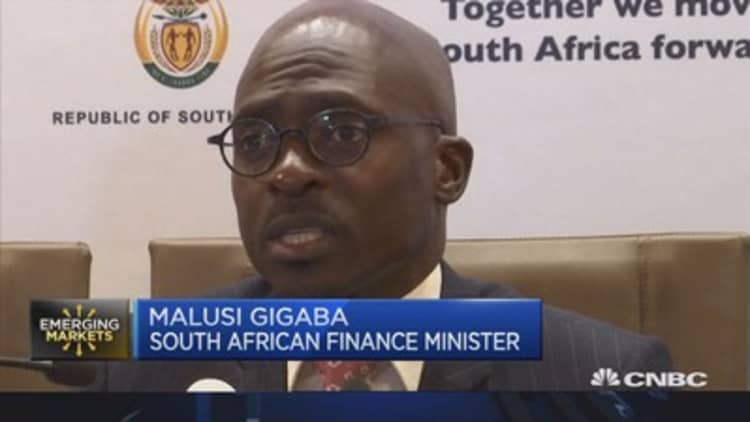
saw renewed pressure Monday morning as investors fret over the shock sacking of highly-respected Finance Minister, Pravin Gordhan, with his replacement beating the drum for a "radical economic transformation" agenda over the weekend.
"The issue of radical economic transformation arises from a criticism that for quite a long time the structure of the South African economy has not been changed. We have not paid sufficient attention to the real economy, to industrializing the economy, to ensuring that we create entrepreneurs and industrialists, particularly among black people," the country's new finance minister, Malusi Gigaba, told reporters on Saturday.
Although "no-one can properly define this term" Peter Attard-Montalto, emerging markets economist at Nomura, told CNBC Monday that it was likely to imply initiatives such as faster land redistribution, forced share ownership changes and higher wealth taxes, with the goal of addressing the fact that around 10 percent of the population – a largely white cohort – still own at least 90 to 95 percent of all wealth, according to widely cited research from REDI published last June.
"It's a very hard to pin down term. The minister had a stab at doing that explanation at the weekend but probably has a lot more explaining to do both to investors and rating agencies," commented the Nomura emerging markets specialist.
South Africa jealously clings to its credit rating which hovers just above the line separating "investment grade" from "junk", however, Gordhan's removal last week and the negative implications it carries for international finance flows into the country, have already triggered an adverse reaction from the biggest agencies.
"Continued political instability that adversely affects standards of governance, the economy or public finances, was one of the
I think there's a very strong possibility (of a downgrade) but mainly on the removal of Pravin Gordhan … Someone was removed from being a finance minister because they were anti-corruption and because they stood up to the forces of rent extraction and various interests that the president had," posited Attard-Montalto.
Calling a rating agency downgrade to junk "long overdue", Timothy Ash,
"Investors at present want to be long emerging markets risk," he noted in an email to clients on Friday, adding, "bond investors want to put money to work in higher yielding emerging markets, such as South Africa, with scope for rate cuts."
"This could support South African markets at least in the short term, and even encourage the rating agencies to give the country another get out of jail card," Ash observed.
Turning to the South African rand, Simon Derrick, chief markets strategist at BNY Mellon, reminded clients in an email on Monday that "when currency volatility hits South Africa then the results can be spectacular."
The rand continued to track lower on Monday, slipping by around 1.2 percent versus the U.S. dollar by 10 a.m. local Johannesburg time, having tumbled by 6 percent on Friday following Gordhan's outing.
Meantime, South African equities edged higher, with the main JSE All-Share index opening slightly up on Monday, having fallen by a total of 6.64 percent last week.


